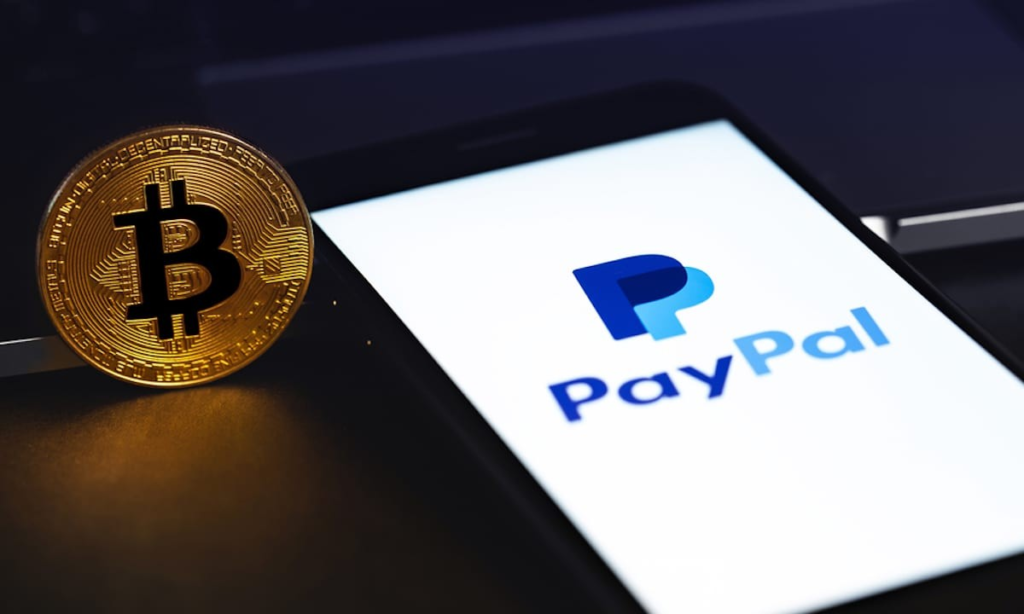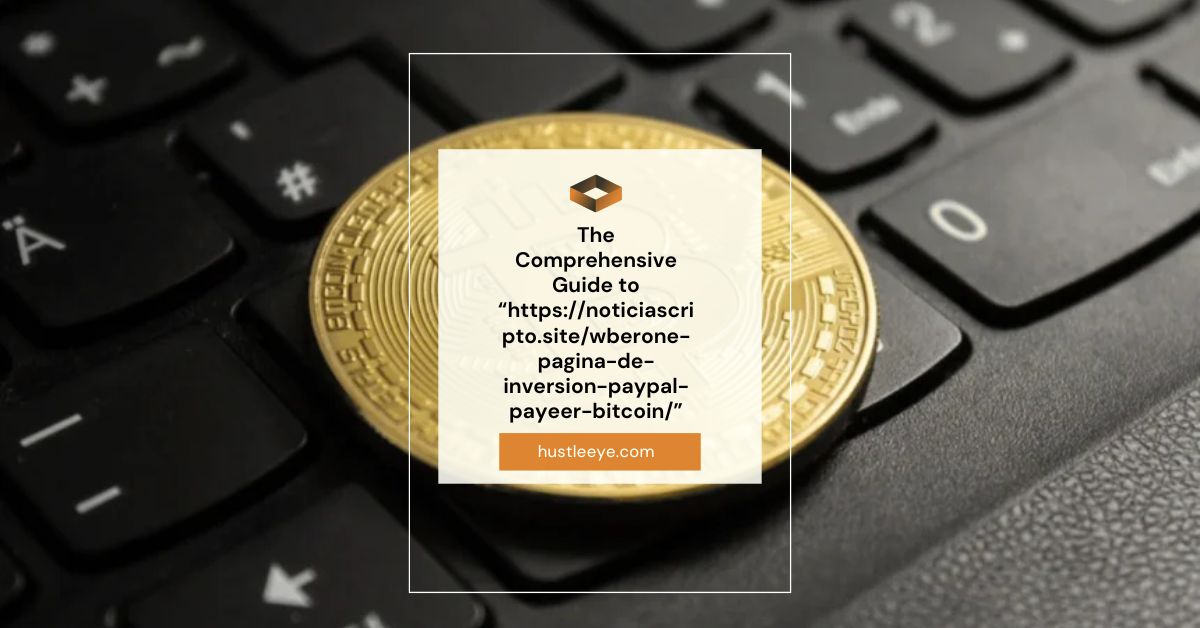In today’s rapidly evolving digital world, cryptocurrencies are no longer a niche interest but a mainstream financial tool. With major players like PayPal stepping into the cryptocurrency space, the landscape is more accessible than ever.
This article will explore the intricacies of PayPal’s involvement with cryptocurrencies, particularly focusing on the comprehensive guide provided by the link “https://noticiascripto.site/wberone-pagina-de-inversion-paypal-payeer-bitcoin/”. This detailed guide will cover the basics of cryptocurrencies, PayPal’s role, how to navigate the platform, and much more. By the end of this article, you’ll be well-equipped to start your cryptocurrency journey with PayPal.
Table of Contents
Understanding Cryptocurrencies:
What is Cryptocurrency?
Cryptocurrency is a digital or virtual currency that uses cryptography for security, making it difficult to counterfeit or double-spend. The decentralized nature of cryptocurrencies, typically based on blockchain technology, ensures that no central authority controls them, providing users with unparalleled freedom and security in their financial transactions.
Read More: MyOLSD: Revolutionizing Education through Technology
Blockchain Technology: The Backbone of Cryptocurrency
Blockchain technology is a decentralized ledger that records all transactions across a network of computers. This transparency and security make blockchain an ideal technology for cryptocurrencies. Every transaction made with a cryptocurrency is recorded on a block and then added to a chain of previous transactions, forming a permanent record that is nearly impossible to alter.

Popular Cryptocurrencies Supported by PayPal:
PayPal supports several major cryptocurrencies, including:
- Bitcoin: Often referred to as digital gold, Bitcoin is the most well-known cryptocurrency and has the highest market capitalization.
- Ethereum: Known for its smart contract functionality, Ethereum is a popular platform for decentralized applications.
- Litecoin: A faster alternative to Bitcoin, Litecoin is often used for smaller transactions.
- Bitcoin Cash: A fork of Bitcoin, designed to be more scalable and efficient for everyday transactions.
- PayPal USD (PYUSD): PayPal’s own stablecoin, pegged to the US dollar, offering stability in the volatile world of cryptocurrencies.
PayPal’s Entry into the Cryptocurrency Market:
1. Why PayPal’s Involvement is a Game-Changer:
PayPal’s entry into the cryptocurrency market is a significant development in the financial world. With over 400 million active users, PayPal’s decision to support cryptocurrencies has accelerated the mainstream adoption of digital currencies. By making it easy for users to buy, sell, and hold cryptocurrencies, PayPal has opened the doors for millions of people to explore the world of digital assets.
2. The Benefits of Using PayPal for Cryptocurrency Transactions:
Using PayPal for cryptocurrency transactions offers several advantages:
- Ease of Use: PayPal’s platform is user-friendly, making it easy for beginners to get started with cryptocurrency.
- Security: PayPal has a strong reputation for security, and its cryptocurrency features are no exception. Users can rest assured that their digital assets are safe.
- Integration with PayPal’s Ecosystem: PayPal users can easily integrate their cryptocurrency transactions with other PayPal services, such as online shopping and money transfers.
- Widespread Acceptance: With PayPal’s extensive network of merchants, users can spend their cryptocurrencies at millions of online stores.
Read More: AOPG Trello: Your Ultimate Guide to Mastering A One Piece Game on Roblox
Getting Started with Cryptocurrency on PayPal:
1. Creating a PayPal Account:
If you don’t already have a PayPal account, the first step is to create one. The process is simple:
- Visit PayPal’s website or download the app.
- Click on “Sign Up.”
- Enter your personal information, including your name, email address, and password.
- Link your bank account or credit card to your PayPal account.
- Verify your account by following the instructions sent to your email.
2. Enabling Cryptocurrency Features:
Once your account is set up, enabling cryptocurrency features is easy:
- Log in to your PayPal account.
- Navigate to the “Crypto” section within the app or website.
- Follow the prompts to set up your cryptocurrency wallet.
Read More: Unlock the Potential of Techdae.frl: A Comprehensive Guide
3. Setting Up a Cryptocurrency Wallet:
Your cryptocurrency wallet on PayPal is where you’ll store your digital assets. Setting it up is straightforward
- After enabling the cryptocurrency features, you’ll be prompted to create a wallet.
- Choose a strong password and enable two-factor authentication (2FA) for added security.
- Your wallet is now ready to use for buying, selling, and holding cryptocurrencies.

Buying Cryptocurrency on PayPal:
1. Step-by-Step Guide to Buying Cryptocurrency:
Buying cryptocurrency on PayPal is a simple process, even for beginners:
- Select Your Cryptocurrency: Choose from the available options, such as Bitcoin, Ethereum, Litecoin, or PayPal USD (PYUSD).
- Enter the Amount: Specify the amount you wish to invest, either in fiat currency (e.g., USD) or in cryptocurrency.
- Review and Confirm: Check the transaction details, including fees and limits, before confirming your purchase.
- Transaction Complete: Your cryptocurrency will be added to your PayPal wallet, ready for you to hold, sell, or spend.
Read More: In Loving Memory of Brad Dummer: A Life Well-Lived in Pecatonica, IL
2. Understanding Fees and Limits:
PayPal charges transaction fees for buying and selling cryptocurrencies. These fees vary depending on the amount of the transaction and the specific cryptocurrency. Additionally, PayPal imposes limits on the amount of cryptocurrency you can buy or sell in a single transaction. It’s important to review these fees and limits before making any transactions to ensure you’re making informed decisions.
3. Maximizing Your Investment Potential:
To get the most out of your cryptocurrency investment, consider the following tips:
- Stay Informed: Keep up with the latest news and trends in the cryptocurrency market.
- Diversify Your Portfolio: Don’t put all your eggs in one basket. Consider investing in multiple cryptocurrencies to spread your risk.
- Set a Budget: Only invest what you can afford to lose. Cryptocurrencies are volatile, and it’s important to manage your risk.
Read More: Understanding the Sound of an Angry Grunt: A Deep Dive into Human Expression
Selling Cryptocurrency on PayPal:
1. How to Sell Cryptocurrency:
Selling cryptocurrency on PayPal is just as easy as buying it:
- Choose the Cryptocurrency: Select the cryptocurrency you wish to sell from your wallet.
- Determine the Sale Amount: Enter the amount you want to sell, either in fiat currency or cryptocurrency.
- Review and Confirm: Check the transaction details, including fees, before confirming your sale.
- Transaction Complete: The proceeds from the sale will be added to your PayPal balance, ready for you to withdraw or use for purchases.
2. Factors to Consider Before Selling:
Before selling your cryptocurrency, consider the following:
- Market Trends: Is the market trending up or down? Selling during a downturn may result in a loss.
- Investment Goals: Are you selling to realize profits, or are you in need of liquidity? Your goals should guide your decision.
- Tax Implications: In the USA, cryptocurrency sales are subject to capital gains tax. Be sure to consult a tax professional to understand your obligations.
Read More: The Color Purple 2023 Torrent: Understanding the Impact and Legal Implications
Holding Cryptocurrency in Your PayPal Wallet:
1. The Importance of Secure Storage:
Storing your cryptocurrency securely is crucial to protecting your investment. PayPal provides a secure environment for holding cryptocurrencies, but there are additional steps you can take to ensure the safety of your assets:
- Enable Two-Factor Authentication (2FA): This adds an extra layer of security to your account.
- Use Strong Passwords: Avoid using easily guessable passwords. Consider using a password manager to generate and store complex passwords.
- Monitor Your Account Regularly: Keep an eye on your account for any unauthorized transactions or suspicious activity.
2. Managing Your Cryptocurrency Portfolio:
PayPal’s platform makes it easy to manage your cryptocurrency portfolio:
- Track Performance: Monitor the value of your holdings in real-time.
- Rebalance Your Portfolio: If your investment strategy changes, you can easily buy or sell cryptocurrencies to rebalance your portfolio.
- Stay Informed: PayPal provides resources and news updates to help you stay informed about the cryptocurrency market.
Read More: Diddy Affidavit 2024: What We Know So Far and What It Means for the Music Mogul
Real-World Applications of Cryptocurrency with PayPal:
1. Everyday Transactions:
One of the most exciting aspects of PayPal’s cryptocurrency features is the ability to use digital currencies for everyday transactions. Many online merchants now accept cryptocurrency payments through PayPal, allowing you to spend your Bitcoin or Ethereum just like you would with traditional currency.
1. Case Studies: Businesses and Individuals Using PayPal for Cryptocurrency
- Businesses: Companies that have integrated PayPal’s cryptocurrency features have seen increased customer engagement and expanded market reach.
- Individuals: Many users have successfully used PayPal to invest in cryptocurrencies, benefiting from the platform’s ease of use and security.
Read More: Mastering the Art of Using a Swizzle Stick: Insights and Tips
3. The Future of Cryptocurrency and PayPal
The future of cryptocurrency looks bright, and PayPal is positioned to play a significant role in this evolution. As more people and businesses embrace digital currencies, PayPal’s cryptocurrency features will continue to grow in importance. Future developments may include expanded support for additional cryptocurrencies, enhanced security features, and greater integration with PayPal’s ecosystem.
Read More: Exploring the World of Gaming: A Comprehensive Guide to the “www.unfgaming.net Blog”
Conclusion:
PayPal’s entry into the cryptocurrency market has made digital currencies more accessible than ever before. Whether you’re a seasoned investor or new to the world of cryptocurrencies, PayPal offers a user-friendly platform that combines convenience, security, and innovation. By following the steps outlined in this guide, you can confidently navigate the world of cryptocurrency with PayPal, taking advantage of the opportunities it offers.
Frequently Asked Questions (FAQs):
1. Can I buy Bitcoin with PayPal?
Yes, you can buy Bitcoin and several other cryptocurrencies directly through PayPal.
2. Are there fees for selling cryptocurrency on PayPal?
Yes, PayPal charges transaction fees for selling cryptocurrencies. These fees vary depending on the transaction amount and the specific cryptocurrency.
3. How secure is my cryptocurrency on PayPal?
PayPal employs robust security measures to protect your cryptocurrency, including encryption and two-factor authentication.
4. Can I use cryptocurrency to make purchases with PayPal?
Yes, many online merchants accept cryptocurrency payments through PayPal.
5. What is PayPal USD (PYUSD)?
PayPal USD (PYUSD) is PayPal’s stablecoin, pegged to the US dollar, offering stability in cryptocurrency transactions.


